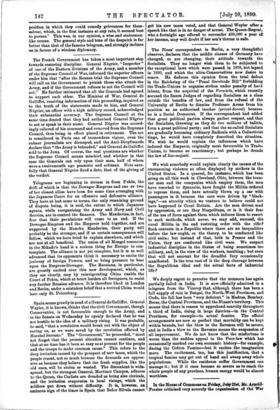The Times' correspondent in Berlin, a very thoughtful observer, declares
that the middle classes of Germany have changed, or are changing, their attitude towards the Socialists. They no longer wish them to be subjected to the exceptional laws which were passed in 1878, but lapsed in 1890, and which the ultra-Conservatives now desire to renew. He deduces this opinion from the total defeat in the Reichstag of the "Penal Servitude Bill" forbidding the Trade-Unions to organise strikes under penalty of hard labour, from the acquittal of the Vorwarts, which recently accused the Saxon Judges of regarding Socialists as a class outside the benefits of law, and from the refusal of the University of Berlin to dismiss Professor Arons from his position as an authorised teacher (privat-docent) because he is a Social Democrat. If the correspondent had added that great political parties always gather respect, and that the Socialists, throwing as they do two millions of ballots, form a great political party ; and that the so-called Socialists are gradually becoming ordinary Radicals with a Collectivist tinge, he would have completely described the situation. We wish he would explain the influences which have induced the Emperor, originally most favourable to Trade- Unions, to become so reactionary ; but perhaps he dreads the law of lose-majesti.


































 Previous page
Previous page